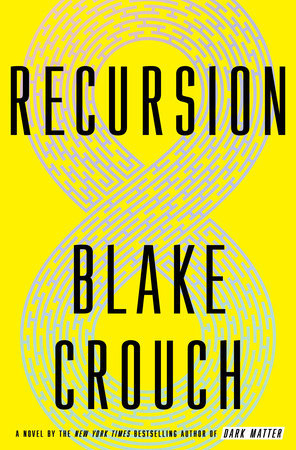He paddles into the cove, picking up speed as he approaches land, running the kayak ashore on a bed of crushed rocks. As he hauls himself awkwardly out of the cockpit, a single memory drops – sitting at that bar in Portland as Helena climbed onto the stool beside him for the first time in their odd, recursive existence.
“You look like you want to buy me a drink.”
How strange to hold three distinct memories of what is essentially the same moment in time.
I reread my review of Blake Crouch's last book (Dark Matter) after finishing this one, and I have to say that my thoughts are exactly the same for Recursion: this isn't great literature, but it's a fun read and would make a thrilling movie (of the sort I don't really watch). I have long thought that if the plot of a book could be satisfactorily presented within an episode of an hour-long series like The Twilight Zone or Black Mirror, it doesn't really need to be a book, but I didn't regret the length here – I was always entertained and can see this being another best seller for Crouch. (Note: I read an ARC and passages quoted may not be in their final forms.)
There are so few things in our existence we can count on to give us the sense of permanence, of the ground beneath our feet. People fail us. Our bodies fail us. We fail ourselves. He's experienced all of that. But what do you cling to, moment to moment, if memories can simply change. What, then, is real? And if the answer is nothing, where does that leave us?
As Recursion opens in November of 2018, we meet NYC Police Detective Barry Sutton as he responds to a suicide call: a woman is threatening to jump from a building, claiming that she has been flooded with hazy memories of a better life that make her current one not worth living. Barry recognises this as another instance of False Memory Syndrome – a seemingly contagious disorder that has been popping up in the area – and as he starts to investigate the phenomenon on his own time, he'll be drawn into circumstances stranger than he could have imagined. In the next chapter, set in October of 2007, we meet Helena Smith: a brilliant research scientist who is attempting to invent a device that can record the memories of dementia patients (like her mother), with a view to re-embedding them once their memories are gone for good. It's not surprising that Barry and Helena's paths will cross when the timelines merge, but Crouch does take the narrative into some surprising places.
Life with a cheat code isn’t life. Our existence isn’t something to be engineered or optimized for the avoidance of pain. That’s what it is to be human – the beauty and the pain, each meaningless without the other.
Layered onto the engaging plot is some sciencey talk (Crouch adequately explains how his device works without relying too much on the mysteries of quantum mechanics), and some philosophical moralising (I suppose it's inevitable that new technology will be grasped by those who want to privitise, monetise, and weaponise), and the plot goes from exploring the possibilities of the science, to crisis, to ramped-up crisis, to freewheeling anything-could-happen-at-this-point (kinda just like how Crouch paced Dark Matter). And it was all fun. I did my best to keep this spoiler free – the details are probably more interesting than I've made them seem.

